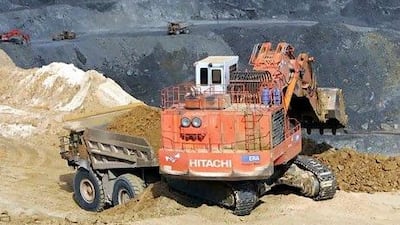For 28 years the state of New South Wales has remained off-limits to uranium exploration even as the rest of Australia took advantage of the world's biggest reserves.
This year, Sydney legislators have overturned a ban on exploration for the material used for nuclear fuel in the hope of eventually supplying new atomic power nations, such as the UAE's. By the end of next year the state hopes to have enough information about its assets to lift a second ban on uranium mining.
"If uranium deposits are found, let's have a mature and rational debate about how we best exploit that resource for the better of the state," said Barry O'Farrell, the premier of New South Wales, who was in Dubai for a trade mission. "I think it would be fantastic to bridge the energy trade deficit with the Middle East."
Since Australia began mining uranium in 1954, it has become the world's biggest producer after Kazakhstan and Canada and has 23 per cent of the world's known reserves. Soon the UAE is expected to sign nuclear cooperation agreements with Australia and Canada to pave the way for the transfer of nuclear knowledge and supplies.
Emirates Nuclear Energy Corporation, the Abu Dhabi government-owned company that is building the emirate's four reactors, is expected to award contracts this year for 15 years' worth of nuclear fuel.
Since New South Wales overturned the exploration ban in March, 25 companies have expressed an interest, according to the premier's office. Exploration includes activities such as studying maps and drilling for samples in the ground.
New South Wales is hopeful that areas such as Broken Hill, a copper mine in the west of the state, share the geology of their neighbours.
But it faces the challenge of a uranium market that has been depressed since last year's triple meltdown and radiation contamination at Japan's Fukushima nuclear plant, which spurred several countries to announce shutdowns of their nuclear reactors. Areva, the French nuclear giant, does not expect demand for uranium to pick up again until 2014.
New South Wales must also appease environmental concerns about uranium mining. Anti-nuclear sentiment was so strong that the movement even preceded the 1979 accident at the Three Mile Island nuclear power plant in the United States, and the ban was signed into law before the Chernobyl disaster in 1986. These two events sparked anti-nuclear sentiment worldwide and stifled the industry for two decades.
"To be fair, there are still people who think uranium, who think nuclear reactors, who think Three Mile Island, Chernobyl and probably don't sleep at night. But I think most people see that whether it's the medical use of what is nuclear medicine or whether it's some of the nuclear reactors that are being built around the world in the past decade and have been stable and safe, that's it not a big deal," said Mr O'Farrell. "Whilst any mining - coal, gas - always provokes some community debate, normally around the environmental consequences … I don't think it will be a major issue ."
Mr O'Farrell was one of the politicians most vocal in getting Australia to loosen up its nuclear export rules late last year to allow for the sale of uranium to India. Some nations are reluctant to supply nuclear goods to India because it never signed the Non-Proliferation Treaty, the 1968 agreement signed by the former USSR, the US and other major powers to prevent the spread of nuclear weapons and technology.
"The fact is that India's a democracy," said Mr O'Farrell. "The fact is that India has strong relations with Australia, and I don't think that India is a rogue nation likely to run off with Australian uranium and misuse it, as people were presumably suggesting."
He would be happy to supply India and other nations, he said. "Should we be successful in removing a mining ban, I wouldn't discriminate as to where it was sold."
twitter: Follow and share our breaking business news. Follow us
iPad users can follow our twitterfeed via Flipboard - just search for Ind_Insights on the app.

